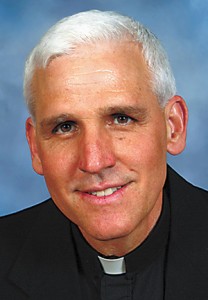By Fr. Bill Kneemiller

First Army Reserve holds its first winter annual training
The glamour of the significance of this training lost its appeal the first two nights at Fort Dix, N.J., when I was experiencing a zero-degree wind chill whip through our tent. A kerosene heater wasn’t enough to keep a nearby water bottle from turning into ice. However, the Army’s three-part component sleeping bag with its double goose-down bags and outer Gortex shell is rated down to zero and works really well. Once I made a little tent out of my poncho liner I was able to sleep, none the worse for wear after this winter trial.
Following this weather challenge, I found myself, as brigade chaplain, privileged to supervise three other chaplains and their assistants. Their denominations included Missouri Synod Lutheran, Church of God, Southern Baptist and “Salvationist,” or member of the Salvation Army.
First meetings with a Salvationist
The second week of training, I asked the Salvationist about his denomination’s baptism. I’ve read in Catholic literature that we do not accept their baptism. The E-4 (specialist rank) told me that baptism for a Salvation Army member was different from other Christians. His answer seemed vague so I asked what the baptismal formula entailed. Finally, he said, “We don’t baptize,” and explained that the Salvation Army believes in a “spiritual” baptism. Dumbfounded, I exclaimed: “Holy cow — you don’t baptize?” I realized this is why the Catholic Church doesn’t recognize their baptism.
Praying with the Baptist senior NCOs
I’ve had a couple of really cool experiences praying morning or evening prayer (Liturgy of the Hours) with Southern Baptist soldiers. In both cases, the soldiers have been senior NCOs (non-commissioned officers of staff sergeant rank or higher). African-Americans from the Deep South, they are steeped in Bible learning, which they call “The Word.” One afternoon, I came up the chow line with about 200 soldiers ahead of me, about a 45-minute wait. Right in front of me were three female senior sergeants from Texas. After exchanging a few pleasantries, I showed them the travel book, “Shorter Christian Prayer,” and asked them if they wanted to “hear God’s word.” Instantly, all three stepped closer. Wow! They didn’t want to miss one word. My experience is that the Baptists have such a respect for God’s word that it manifests as reverence and attentiveness to biblical study that is a joy to behold.
Private Kneemiller reporting for duty
One of the battalion chaplains knows the head cook and offers to help serve supper chow, along with the chaplain assistant. A couple of days later, I offer to help serve the meal, go to the head cook, a staff sergeant, and announce: “Private Kneemiller reporting for duty.” I am reminded of my dad’s rank in the Army in WWII, and his trials in being in the Battle of the Bulge. Every time I show up for duty, the staff sergeant assigns me to serve vegetables. Upon plopping the veggies on a plate, I sometimes comment to the soldiers that they are now “vegucated.”
The chow hall is where I get to see the diversity of the U.S. Army. Two are junior enlisted who were born in Laos and Bangladesh. There’s also wide latitude in the social-economical backgrounds. The officer in charge is a chemist in civilian life who works as a consultant to the food industry. Next to me on the chow line are a couple of Hispanic junior enlisted who work at fast-food restaurants in downtown and inner-city Chicago.
Why is the chapel tent so close to the smoke point?
I usually comment that it represents “Holy Smoke.” But what really disarms the smokers is when I ask: “What do you call a group of smokers?” Usually they will think of something negative like, “Future cancer patients.” I encourage them to think about it, and then say: “A group of smokers would be called a ‘pack of smokers.’” The younger enlisted soldiers laugh uproariously, but as they do so, I recall the old axiom, “the higher the rank, the funnier the joke.”
I will close with an image from the smoking area that I believe helps explain something about Army tradition. Every night at 1700 hours (5 p.m.), the National Anthem is played at main post and we can still hear it out in the field. As the anthem begins, the dozen of smokers lounging around the sandbag fortifications are transformed from a loose gaggle just “smokin’ and jokin’” to standing at attention and saluting the post flag. This little episode every night reinforces for me that the best the military can offer is a sense of discipline and innate patriotism. It is also a comfort to recall that because of the great power and potential for the misuse of the military, there’s a long tradition that civilians have oversight and ultimate control over the military. I am proud of these younger soldiers for their observance of the long-standing disciplines of the military and their patriotic salutes on a blustery day here at historic Fort Dix, N.J.
(Father Bill Kneemiller is a chaplain in the U.S. Army Reserves and pastor of Ss. Philip & James Parish, Grand Mound; Sacred Heart Parish, Lost Nation; St. James Parish, Toronto; and, Sacred Heart Parish, Oxford Junction.)








